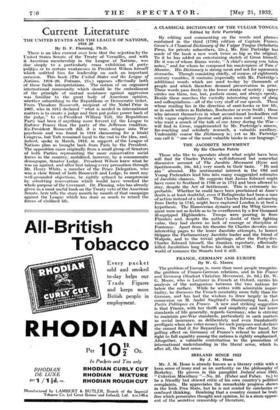THE JACOBITE MOVEMENT By Sir Charles Petrie Those who like
to speculate about what might have been will find Sir Charles Petrie's well-informed but somewhat discursive account of The Jacobite Movement (Eyre and Spottiswoode, 10s. 6d.) very much to their taste. Ifs and ans " abound. His sentimental interest in the Old and Young Pretenders lead him into many exaggerated estimates of Jacobite chances. He suggests that James Edward might have come to Scotland in 1708 or in 1712 and been allowed to stay-, despite the Act of Settlement. This is extremely im- probable. Whether he could have been proclaimed at Anne's death is at least doubtful, even if Bolingbroke had been a man of action instead of a talker. That Charles Edward, advancing from Derby in 1745, might have captured London is at best a hypothesis. The Hanoverian dynasty and the Whig Govern- ment were not so feeble as to be overthrown by a few thousand ill-equipped Highlanders. Troops were pouring in from Flanders and, despite the author's doubt of their fighting value, they had shown no lack of courage or discipline at Fontenoy. Apart from his theories Sir Charles devotes some interesting pages to the lesser Jacobite attempts, to honest Shippen the Parliamentary Jacobite leader and the friend of Walpole, and to the trivial plottings after the Forty-five. Charles Edward himself, the drunken reprobate, effectually killed Jacobitism long before his death in 1788. But in the world of romance the Stuarts lord it still.




































 Previous page
Previous page